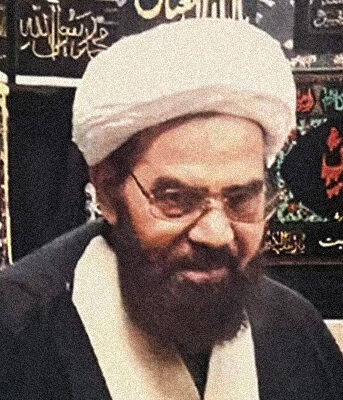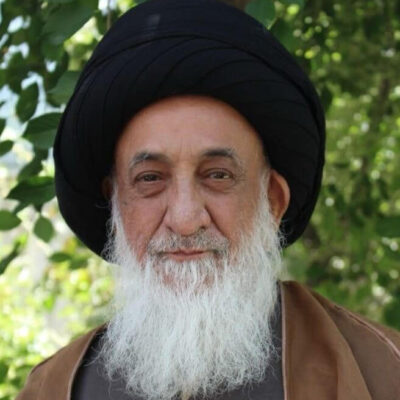In Memoriam

Shaykh Abbas Mesbahzadeh
Shaykh Abbas Mesbahzadeh studied under prominent scholars of his time in Qom, specializing in the pure religious sciences while also taking great interest in poetry, astronomy, and calligraphy. Famous versions of the Qur’an, Sahifah Sajjadiya and Mafatih al-Jinan are the result of his calligraphic endeavors. He was also known for his expertise in preparing the hijri solar and lunar calendars and also salat timetables for many cities in the West. Shaykh Abbas Mesbahzadeh’s association with the Muhammadi Trust (UK) led to the production of some prominent and beautiful works of calligraphy in various Islamic centers, especially in the mihrab and large panels of the hall in the Muhammadi Islamic Centre (later known as Jaffari Islamic Centre) in Toronto. In 1989, he moved to the US and eventually established Mo’assasseh-ye Eslami Ahl-ul-Bayt in Virginia in 1990 where he continued preaching for two decades with sincerity and simplicity.

Sayyid Ali Murtada

Sayyid Fadhil Jamal al-Din
Sayyid Fadhil Jamal al-Din (1942–2015) was a poet, writer, and religious scholar who dedicated his life to education, community service, and Islamic values. After graduating from the "Dar al-Mu'allimin" academy in 1961, he worked as a teacher and later as a school director, focusing on instilling Islamic morals and identity in his students. Following the Shaaban uprising in 1991, he became a refugee, living in the Rafha camp in Saudi Arabia before relocating to Syria to continue his seminary studies. Later, he immigrated to the United States, where he engaged in religious and social activities, including serving as a spiritual advisor in Michigan. Sayyid Fadhil passed away in 2015 and was buried in Wadi Al-Salam Cemetery in Najaf, Iraq.

Sayyid Husain Sajedi
Sayyid Husain Sajedi was born into a devout religious family in Kabul in 1940. From a young age, he displayed a strong inclination towards Islamic learning, beginning his Quranic studies early and memorized the Quran by the age of 20. He pursued advanced religious studies and became a distinguished student of Sayyid Hadi Milani. His contributions to Islamic education and community development were profound; he mentored numerous students, dedicated several years to teaching in the United States, and helped in establishing a number of Islamic centers throughout his lifetime.

Shaykh Mohamad Jawad Chirri
Shaykh Mohamad Jawad Chirri (1905–1994) was a Lebanese-born scholar, theologian, and pioneer of Islamic outreach in the United States. A graduate of the hawzah of Najaf, he moved to Detroit in 1948 to serve the growing Lebanese-American Muslim community. Shaykh Chirri spearheaded the establishment of the Islamic Center of Detroit, later renamed the Islamic Center of America, which opened in 1962. His advocacy included fostering unity between Islamic sects, highlighted by his historic dialogue with Shaykh Mahmood Shaltut of Al-Azhar, leading to the recognition of equality between Shi'ite and Sunni schools. A prolific author and lecturer, Shaykh Chirri wrote influential works like Inquiries About Islam and The Faith of Islam, becoming a respected authority on Islamic teachings. His leadership and scholarship laid the foundation for one of the largest mosques in North America, with the Islamic Center of America moving to its current location in Dearborn in 2005.

Shaykh Mohsen Sbeiti
Shaykh Mohsen Sbeiti (1936–2017) was a revered religious and community leader who dedicated his life to serving the Shia Muslim community in Greater Montreal. Through immense effort and collaboration, he played a key role in establishing an Islamic center that became a vital hub for the community. Shaykh Mohsen Sbeiti was instrumental in fostering unity, brotherhood, and cooperation among community members, transcending political and social differences. At a time when scholars rarely visited the city and there were no resident scholars to oversee the community’s affairs, Shaykh Mohsen’s presence brought much-needed guidance and stability. His tireless commitment to religious education and spiritual leadership profoundly impacted the community. Over the course of his 81 years, he left behind a lasting legacy of service and dedication.

Sayyid Muhammad Husayn Jalali
Sayyid Muhammad Husayn Jalali (1944 - 2020) was born to a scholarly family in Karbala. He was trained from an early age in the religious scholarly circles of Karbala and completed his advanced studies in Najaf. After settling in the Chicago, one of the first things he did was establish the first cemetery for the followers of Ahl al-Bayt. He was a man of foresight who looked to the future for his community and his faith. In Chicago, he served the cause of the Ahl al-Bayt by making himself available to anyone and everyone for religious studies free of charge. He remained independent of any affiliation with any religious group or organization. He did not join or lead any mosque or any other religious association. Instead, he served the community from his own home, and also taught lessons in his home, which he called “The Open School” because it was open to all. No one who wanted to learn was ever refused, and no one was ever charged fees. He firmly believed that education was the right of everyone.

Shaykh Sayel al-Atat
Shaykh Sayel Al-Atat, born in Younin, Lebanon, in 1951, was a well-known scholar and community leader in the Detroit area. He migrated to Najaf at the age of 16 to begin his formal religious education and later continued his studies in Qom. In 1989, he moved to the United States, where he served the Shia Muslim community in Michigan for decades. Following the passing of Imam M. Cherri, Shaykh Al-Atat served as an official Imam at the Islamic Center of America for almost two years. He was dedicated to the advancement of Islam and community service, earning widespread respect for his perspectives, generosity, and kindness. Shaykh Sayel firmly opposed extremism, intellectual stagnation, and social injustices, which earned his love and admiration from those who knew him. He passed away in May 2017 in Dearborn and was laid to rest at the Islamic Memorial Garden Cemetery.

Sayyid Tilmiz Hasnain Rizvi
Sayyid Tilmiz Hasnain Rizvi (1941 - 2021) was born in Bihar, India and migrated to Pakistan, where he began his foundational Islamic studies at a young age under esteemed sholars. Maulana Tilmiz pursued further studies at Madrasa Jamiʿah Imāmiyah in Lahore, where he spent two years studying alongside Maulana Agha Jafar ibn Maulana Ali Haider. As a prolific scholar and writer, Maulana Tilmiz collaborated with Dr. Manzoor Rizvi to author several works, including A Guide to Quran and Diniyāt in Urdu, which became important educational resources for Madaris in North America. His literary contributions extended to translating over 30 books.

Sayyid Zaki al-Swij
Sayyid Mohammed Zaki Alswij (1951–2008) was a prominent Shia scholar and community leader. Born in Najaf, Iraq, he began his studies in the Hawzah under esteemed scholars such as Sayyid Jamaludeen al-Khoei and Sayyid AbdulSahib al-Hakeem. Sayyid Zaki moved to Qom in 1984 and later to the U.S. in 1987, where he played a pivotal role in establishing the Islamic Education Center in Houston, as well as several centers in cities like Chicago and Dallas. His major achievement was founding Masjid Al-Rasool Al-Akram (P) in Texas in 2005, the first masjid for Ahl al-Bayt followers in the state. He was also a key founder of the Council of Shia Muslims of North America. Sayyid Zaki dedicated his life to propagating Islam and advancing projects for the betterment of the Shia community, leaving behind a lasting legacy. He passed away in 2008 and is buried in Najaf, Iraq.
